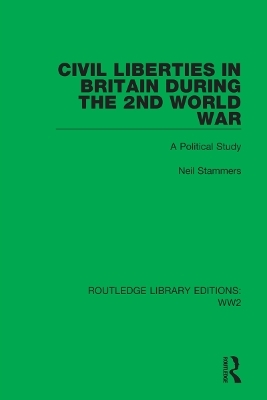
Civil Liberties in Britain During the 2nd World War
Routledge (Verlag)
978-1-032-07807-6 (ISBN)
War and such crises are seen as aberrations in the history and development of democracy – a time when otherwise unacceptable constraints can be imposed on the ordinary man with little or no dissent. The reasoning behind this is questioned in this book, first published in 1983. It makes a detailed study of government policy towards civil liberties in Britain during the Second World War, the nature of crisis government and its implications for democracy. Drawing on government documents and other primary sources, the book examines policies implemented, such as the Emergency Powers (Defence) Act of 1939 and Regulation 18B. Other government policies such as the internment of enemy aliens, restrictions on the media and the mobilisation of propaganda for the war effort are analysed thoroughly.
Neil Stammers
1. The Nature of Emergency Powers and the Limitations of Parliamentary Control 1.1. The Development of Emergency Legislation 1.2. The Emergency Powers (Defence) Act 1939 and the First Defence Regulations 1.3. Opposition to the Defence Regulations and their Amendment 1939 1.4. The Military Crisis and New Powers 1.5. The Resistance to Change 1.6. Commentary 2. The Internment of Enemy Aliens 2.1. Pre-War Planning and the Aliens’ Tribunals 2.2. The Policy of General Internment 2.3. Conditions Chaos and Deportations 2.4. The Growth of Opposition and the Government Response 2.5. Commentary 3. The Debates Over Regulation 18B 3.1. Regulation 18B and its Use 3.2. The Development of United Opposition 3.3. The Disintegration of United Opposition 3.4. Commentary 4. The Control of Political Action 4.1. The Chamberlain Government and Anti-War Propaganda 4.2. The Coalition Government and the Invasion Crisis 4.3. The Communist Party in the Blitz 4.4. Unwelcome Allies 4.5. Towards D-Day and Peace 4.6. Commentary 5. Censorship and the Media 5.1. Postal and Telegraphic Censorship 5.2. The National Press 5.3. The BBC 5.4. Commentary 6. Mobilisation for the Total War Economy 6.1. Early Concepts of Manpower Policy and the Need for Consensus 6.2. The Machinery of Compulsion 6.3. The Application of Controls in General 6.4. Degrees of Coercion – Pressure, Directions and Prosecutions 6.5. Commentary 7. Civil Liberties in Industry 7.1. Industrial Appeasement to the Establishment of Tripartism 7.2. The industrial Imperative 7.3. The Rise of Industrial Unrest 7.4. Commentary 8. Historical Postscript – the End of the War 9. Conclusions 9.1. Government Practice and Civil Liberties 9.2. Democracy and Crisis Government
| Erscheinungsdatum | 29.03.2023 |
|---|---|
| Reihe/Serie | Routledge Library Editions: WW2 |
| Verlagsort | London |
| Sprache | englisch |
| Maße | 156 x 234 mm |
| Gewicht | 480 g |
| Themenwelt | Geschichte ► Allgemeine Geschichte ► 1918 bis 1945 |
| Geschichte ► Teilgebiete der Geschichte ► Militärgeschichte | |
| Sozialwissenschaften ► Politik / Verwaltung ► Politische Systeme | |
| ISBN-10 | 1-032-07807-3 / 1032078073 |
| ISBN-13 | 978-1-032-07807-6 / 9781032078076 |
| Zustand | Neuware |
| Informationen gemäß Produktsicherheitsverordnung (GPSR) | |
| Haben Sie eine Frage zum Produkt? |
aus dem Bereich


